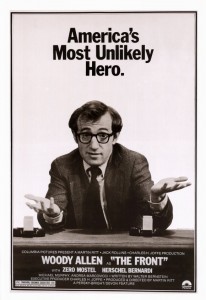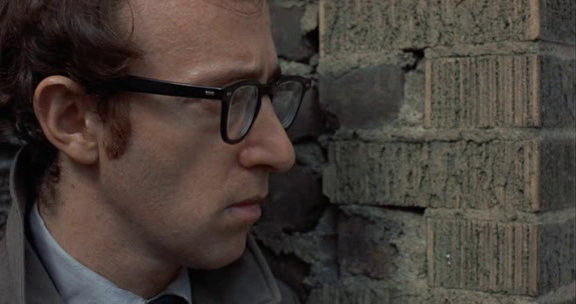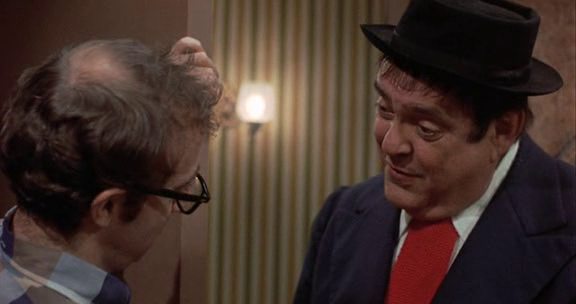|

Synopsis:
In the 1950s, an apolitical cashier (Woody Allen) agrees to act as a “front” for his blacklisted friend (Michael Murphy) and two other television writers, taking 10% of their earnings as commission. Soon he finds himself in a sticky situation, as his activities are monitored by HUAC and he’s asked to “name names”.
|
|
Genres, Themes, Actors, and Directors:
- Character Arc
- Hollywood
- Martin Ritt Films
- Michael Murphy Films
- Woody Allen Films
- Writers
Response to Peary’s Review:
Peary’s clearly an enormous fan of this “excellent, often forgotten little picture” (written by Walter Bernstein, directed by Martin Ritt, and starring Woody Allen) — enough so that he names it the Best Picture of the Year in his Alternate Oscars, and lists no “runners-up”. He writes that it’s “humbly, gently, humorously made”, with “much ironic humor com[ing] from the absurdity of the situation, where a man can be blacklisted if the committee gets his name mixed up with that of a ‘leftist sympathizer’ and he can’t clear himself unless he can name names”. He adds that “despite the film’s friendly tone, viewers get a sense of the paranoia, desperation, and insanity of the period, and come to understand why those who were blacklisted — like Bernstein and Ritt” (and several actors in the film, including Zero Mostel) “still detest those who gave testimony during the fifties witchhunt”. He concludes his review by noting that the “film is a tribute to those who took moral stands during that time”.
While I agree with Peary that The Front remains a powerful and riveting drama — one which all film fanatics should see, simply for its important subject matter — it’s not quite “best picture” material; it eventually devolves into comedically melodramatic fairy tale territory in its final reels, and the romantic subplot between Allen and a beautiful television employee (Andrea Marcovicci) feels underdeveloped. The most affecting aspect of the film is the subplot involving comedy actor “Hecky Brown” (Mostel), whose situation most succinctly embodies the true paranoia of the period. His inability to remain employed after being unable (or unwilling) to “name names” sends him on a degrading downward spiral; Mostel’s performance is both brave and visceral in its depiction of Hecky’s despair and resignation. Allen gives a fine performance as well, playing a variation on his typical character (his “Howie” is “a funny guy, which makes him appealing” to his girlfriend and Hecky), yet one who undergoes a profound shift in political awareness.
Redeeming Qualities and Moments:
- Woody Allen as Howard Prince (nominated by Peary as one of the Best Actors of the Year in Alternate Oscars)

- Zero Mostel as Hecky Brown

Must See?
Yes, as a powerful evocation of a notorious era in Hollywood.
Categories
Links:
|



One thought on “Front, The (1976)”
A once-must, at least – for story and for the marvelous performances by Allen and esp. Mostel.
What’s most interesting about the quote chosen to head this review is that it perfectly sums up a world in which people lie. Naturally, people (as a whole) lie to varying degrees. But here’s a film in which people are forced to lie because they’re being ruthlessly attacked for what may or may not have been solid principles.
I disagree with Peary about this film containing “much ironic humor” (which I don’t see at all in the film) and the film having a “friendly tone”. Huh? Yes, viewers will see “the insanity of the period” – as well they should; that’s what this film is about. There may be the odd light touch here and there but, for screenwriter Bernstein, this is largely payback with a vengeance.
I would not say that “it eventually devolves into comedically melodramatic fairy tale territory”. Quite the contrary – I think it follows its ‘logical’ conclusion (even if it famously ends with its unlikely final line). The love story angle reads believable to me.
Allen surprises all of his fans here by playing way against type: he’s largely an opportunist. (It’s especially gripping when he ‘turns on’ those he’s covering for by making largely unexplained – because his character is not a writer himself – demands on them.)
If for no other reason – though the subject matter is reason enough – this is to be seen for Mostel. He is truly amazing here. We can balk over the fact that Mostel did not make nearly enough films. (It’s so unfortunate that he was passed over for the film version of ‘Fiddler’ – would have improved the film immensely.) But Mostel, aside from being a large man, was a large performer, better suited for the stage. In ‘The Front’, he probably gives his most toned-down screen performance overall.
(I should also point out that Murphy impresses me here. Elsewhere, he generally comes off as a kind of bland performer – but he responded well to Ritt’s direction, apparently.)
I could nitpick a bit in some of the details. For example, I think Murphy’s character – as a writer – would probably have schooled Allen’s character a bit more in how to pass himself off as a writer. The fact that Allen comes off as something of a dunderhead his first time as a cover doesn’t really work for me. Surely the questions put to him would have been, to a degree, anticipated.
But, overall, this is a very compelling film.